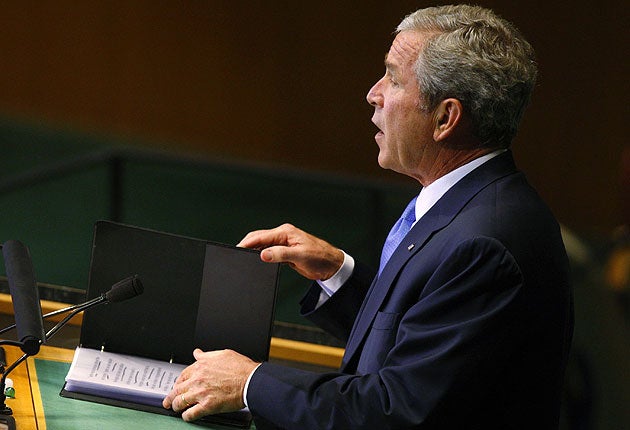Unrepentant Bush delivers his last speech to UN

There was no departing from his usual script of indignant impatience at the shortcomings of other world leaders, governments and institutions as President George Bush came to New York today to give his eighth and last address to the United Nations, a body that has never found him particularly palatable.
An unrepentant Mr Bush, who might have been on the defensive not least because of the meltdown of American financial institutions over recent days, if not the continuing war in Iraq, instead rehearsed familiar appeals for pushing out the boundaries of freedom, justice for terrorists and punishment for countries that may harbour them.
While paying some lip service to the UN saying that it and other "multilateral organisations are needed more than ever," he implied that the body and its members had been too passive in combating terrorism, which he said, remained the greatest "threat to our civilisation".
"To be successful, we must be focused, and resolute, and effective," he told world leaders inside the General Assembly hall. "Instead of only passing resolutions decrying terrorist attacks after they occur, we must cooperate more closely to keep terrorist attacks from happening in the first place."
While the putative theme of this week's gathering of heads of state and government is restoring momentum towards achieving the UN's so-called Millennium goals of eradicating hunger and poverty throughout the world, the financial meltdown in the US was inevitably eclipsing all normal business.
Nor could Mr Bush escape the uncomfortable reality of the distress on Wall Street and the ripples that it is sending around the globe. In private meetings with other leaders throughout yesterday and in the course of his address he attempt to offer some reassurance that the rescue package put together by the Treasury and Federal Reserve would emerge soon from the US Congress.
"We have taken bold steps to prevent a severe disruption of the American economy, which would have a devastating effect on other economies around the world."
President Bush did not miss the opportunity while at the podium, however, to criticise Russia for its August invasion of Georgia, remarks that prompted Russia's Foreign Minister (and former ambassador to the UN) Sergei Lavrov to exchange what looked like a joke with a colleague seated beside him.
"We must stand united in our support of the people of Georgia," he said. "The United Nations' charter sets forth the equal rights of nations large and small. Russia's invasion of Georgia was a violation of those words. Young democracies around the world are watching to see how we respond to this test".
Mr Bush, who met privately with Asif Ali Zardari, the President of Pakistan whose country is mourning the 53 victims of the Marriott Hotel bombing, this time singled out just two countries for remaining outside the consensus to eradicate terrorism. "A few nations -- regimes like Syria and Iran -- continue to sponsor terror, yet their numbers are growing fewer and they're growing more isolated from the world," he said.
For his part, the Iranian President, Mahmoud Ahmadinejad argued that America's military engagement around the world were to blame for the crisis on Wall Street. ''Problems do not arise suddenly," he said. "The US government has made a series of mistakes in the past few decades. The imposition on the US economy of the years of heavy military engagement and involvement around the world... the war in Iraq, for example. These are heavy costs imposed on the US economy."
In a strikingly gloomy address, the UN Secretary General, Ban Ki Moon voiced concern that a world economic slowdown represented one of several threats to progress towards world peace and security. "We all recognise the perils of our current passage," he said. "We face a global financial crisis. A global energy crisis. A global food crisis. Trade talks have collapsed, yet again. We have seen new outbreaks of war and violence, new rhetoric of confrontation. Climate change ever more clearly threatens our planet."
If Mr Bush is unpopular within UN walls, it partly dates back to his 2003 decision invade Iraq without proper authority. Yesterday, however, he made one last appeal for world leaders to support the country's return to democracy, which, he said, was moving forward under improved security conditions.
"Whatever disagreements our nations have had on Iraq, we should all welcome this progress towards stability and peace, and we should stand united in helping Iraq's democracy succeed," he said.
The President of Argentina, Cristina Fernandez de Kirchner, used her time at the podium partly to call on the body to support her country's claim of sovereignty over the Falkland Islands. Mrs Fernandez said that the British Government, as a member of the Security Council, had a moral obligation to comply with UN charter articles to end the status of the islands as "colonial enclave" in the 21st Century, complaining that so far London has "resolutely refused" to engage in any negotiations with her government.
Join our commenting forum
Join thought-provoking conversations, follow other Independent readers and see their replies
Comments